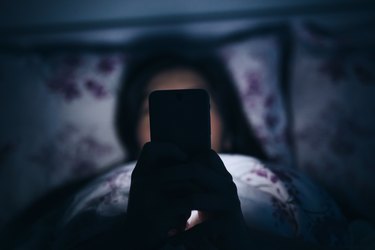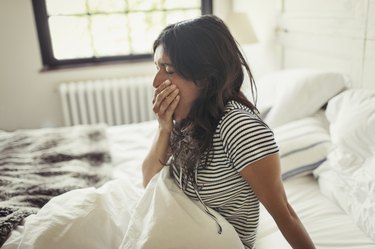
Perhaps you've been warned to shut off your devices before bed or wear special computer glasses to avoid exposing your eyes to blue light. But what is blue light, exactly, and is it actually bad for your health?
First things first: "Blue light is light in the visible portion of the light spectrum with a wavelength between 400 and 450 nanometers," says Norman Shedlo, OD, an optometrist based in North Bethesda, Maryland. It's typically emitted from the sun, electronic devices and fluorescent and LED lights.
Video of the Day
Video of the Day
Here, experts explain the effects of blue light, including what blue light does to your eyes and tips to limit exposure.
How Blue Light Affects Your Health
Here's a breakdown of how blue light exposure may harm your health:
1. It Can Strain Your Eyes
While little is known about what dose of blue light hurts your eyes, research using animal models suggests that prolonged exposure to blue light can cause retinal damage to photoreceptors, says Michael J. Shumski, MD, board-certified ophthalmologist at Magruder Laser Vision.
What's more, chronic exposure to blue light is bad for your eyes because it can lead to eye strain, eye fatigue and, as a result, headaches.
These collective symptoms are also known as computer vision syndrome, which has "increased over the past decade as our use of digital devices with blue light-emitting screens has increased," Dr. Shumski says.
And per a December 2018 article in the International Journal of Ophthalmology, blue light exposure is also linked to the development of eye conditions such as:
- Dry eye
- Cataracts
- Age-related macular degeneration
2. It Can Harm Your Sleep Quality
Not only does blue light have the potential to damage your eyes — it can also get in the way of a solid snooze.
Your brain responds to environmental changes, such as a change in light. Research has shown that light suppresses melatonin (a hormone that signals sleep), including blue light, according to a February 2019 review in Chronobiology International.
"When exposed to blue light, the brain perceives it as daylight," Alex Savy, certified sleep science coach, tells LIVESTRONG.com. "In other words, looking at screens in the evening can make the brain think it's still daytime. This typically leads to melatonin suppression, leaving the brain more alert and making it harder for people to fall asleep."
And a lack of zzzs has downstream effects: For instance, not getting enough sleep has been linked to increased risk for depression, diabetes and heart problems, according to Harvard Health Publishing.
3. It May Increase Your Risk for Disease
There's also some evidence to suggest that blue light exposure is linked to the development of other health conditions.
For instance, September 2020 research in Epidemiology found that outdoor blue light exposure was linked to an increased risk for colorectal cancer.
How to Limit or Avoid Blue Light Exposure
Now you know what blue light is and how it affects your health. Luckily, though, there are some steps you can take to minimize these consequences.
1. Consider Wearing Blue Light-Blocking Glasses
Savy says one of the easiest ways to limit your intake of blue light exposure is by wearing blue light-blocking lenses. These glasses are designed to reduce your exposure to blue light from the sun or your digital devices through blue light-absorbent filters.
It's worth noting, though, that not everyone agrees these glasses work. The American Academy of Ophthalmology, for example, does not recommend them, citing a lack of evidence around their benefit. And a February 2021 study in the American Journal of Ophthalmology found that blue light-blocking lenses aren't any more effective at improving symptoms of digital eye strain than clear lenses.
But if you want to give them a try to see if they work for you, there's no harm. Many blue light glasses are available over-the-counter at major retailers, or you can talk to your eye doctor about adding a blue light filter to your prescription lenses.
2. Turn Off Your Devices
Dr. Shedlo recommends powering down your devices at least an hour before bed to avoid having blue light interfere with your sleep.
However, this is often easier said than done. So if you're using a device that emits blue light close to bedtime, turn on "dark mode" or "night mode." While it still emits blue light, it won't be as harsh, says Logan Foley, sleep science coach with the Sleep Foundation.
"You can change the screen color gamut on your device to warmer colors before bedtime or consider wearing orange/red-tinted glasses before going to sleep," he says, as these colors help block blue light from reaching your eyes.
3. Cut Down Your Exposure
You can also cut back on blue light by reducing your device usage throughout the day, Foley says. Maybe this means avoiding cellphone use in between computer tasks, taking more frequent breaks from your screen or reading a physical book instead of an e-reader that emits blue light.
Tip
To get eye strain relief, try the 20-20-20 rule: Every 20 minutes, take a break and stare at something that's at least 20 feet away for at least 20 seconds.
- Chronobiology International: "Systematic review of light exposure impact on human circadian rhythm"
- Epidemiology: "Association Between Outdoor Light-at-night Exposure and Colorectal Cancer in Spain"
- Harvard Health Publishing: "Blue light has a dark side"
- International Journal of Ophthalmology: "Research progress about the effect and prevention of blue light on eyes"
- American Academy of Ophthalmology: "Are Blue Light-Blocking Glasses Worth It?"
- American Journal of Ophthalmology: "Do Blue-blocking Lenses Reduce Eye Strain From Extended Screen Time? A Double-Masked Randomized Controlled Trial"
Is this an emergency? If you are experiencing serious medical symptoms, please see the National Library of Medicine’s list of signs you need emergency medical attention or call 911.


